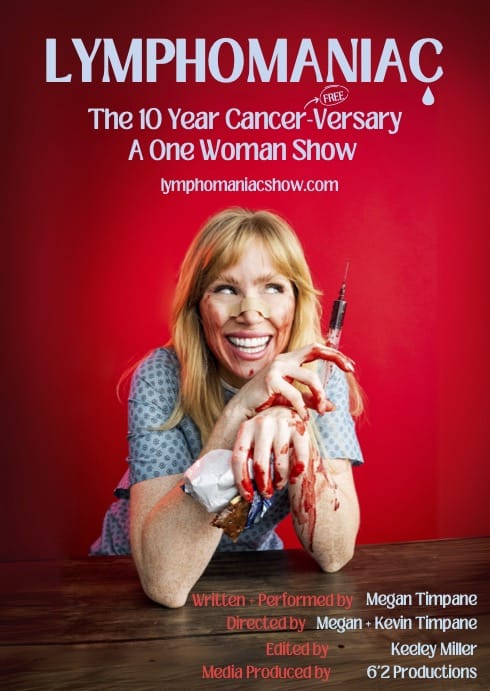Q&A: How Alumna Megan Timpane Turned Her Cancer Diagnosis Into a Raw, Hilarious Stage Hit

From the halls of UCLA to center stage at the Edinburgh Fringe Festival, Megan Timpane (BA, 2013) has never shied away from telling the hard stories with heart, humor and humanity. In her one-woman show Lymphomaniac, Timpane transforms her battle with stage 3 Hodgkin’s lymphoma into a brutally honest and darkly funny exploration of illness, anxiety, resilience and recovery.
First written just two months after completing chemotherapy, the show has evolved into a powerful meditation on life after trauma—one that’s as hilarious as it is heartbreaking. As Lymphomaniac prepares for its international debut this summer, Timpane sat down with UCLA TFT to reflect on the origins of the show, the role humor plays in healing and how her time as a UCLA Theater student laid the groundwork for storytelling that doesn’t flinch from the truth.
TFT: Lymphomaniac is such a personal and powerful piece. What was the catalyst to you deciding to tell this story so soon after treatment?
Megan Timpane: One of the ways I coped with the shock and sadness after my diagnosis was by practicing gratitude. I made it a habit to write down five things I was grateful for every day. At first, they were simple: “I’m grateful I was able to walk around the block today.” But over time, these entries expanded to include moments of joy I hadn’t noticed before: “I’m grateful the nurse who took my vitals made me laugh with her dancing.”
I realized that the people I interacted with at the hospital had a profound impact on my day. They became characters in my life, bringing laughter and light even during difficult times. As an impressionist, I wanted to honor the spirit of these amazing people by writing a piece that captured a day in the life of chemo. I also felt compelled to speak about the things people don’t often discuss when it comes to cancer, especially as a young adult. I wanted to give a voice to the unspoken.
TFT: What does the title Lymphomaniac mean to you, and how did it come about?
MT: Lymphomaniac is a play on words, stemming from my experience with lymphoma, but it truly captures the spirit of the show. It’s an irreverent comedy about having cancer—raw, funny, and brutally honest. I leave everything on the table, using humor to process the chaos. Lymphomaniac felt like the only title that fit the wild, funny, and heartwarming essence of the performance.
TFT: How did you balance the show’s humor with the emotional weight of your experience?
MT: I’ve been reflecting on how I would define myself creatively and what I’ve realized is that I articulate the unspoken, often uncomfortable truths of human experience through humor. It’s a way to make heavy topics more accessible. Humor has a unique ability to connect us, and I find it’s often the best way to explore deep, difficult emotions. People naturally want to laugh and be entertained—if that laughter can open the door to deeper reflection, it’s an incredibly powerful tool.
TFT: How has the show evolved since its earliest performances to this 2025 run?
MT: When I first wrote and performed the show 11 years ago, the message was simple: I used humor and the support of my community as tools to overcome something difficult. Now, over a decade later, the story has evolved. I struggled to put a bow on the new message because life after cancer isn’t neatly wrapped up. The new version embraces that complexity. It’s more open-ended, exploring the unseen, lingering effects of trauma that don’t just disappear once treatment ends. I’ve kept some elements of the original show but revamped them to reflect a more nuanced understanding of life after illness.
TFT: One-person shows are no easy feat. What advice do you have for current theater students looking to tell stories in a similar format?
MT: Be clear on why you’re creating and what you want to say. In school, you have the freedom to experiment and see what sticks, but once you’re creating for an audience, focus and clarity are key. Your message should be succinct and purposeful. Always consider what the audience will gain from your piece. The clearer your intention, the easier it is to edit and stay on track.
TFT: What have you learned about yourself as a performer during this project?
MT: I’ve realized that I don’t really identify as an “actor” anymore. I stopped acting professionally about seven years ago and pursued a career in Corporate Training. Revisiting the identity of “actor” or “creative” has been both challenging and invigorating. I was initially afraid to perform again because my instrument felt rusty. Even though I speak publicly for a living in front of thousands, sharing my personal story felt uniquely vulnerable. But I’ve come to understand that there is no courage without fear—performing this show has reaffirmed that for me.
TFT: How did your time at UCLA TFT influence your approach to storytelling or performance? Were there any particular professors, classes or projects during your time at TFT that helped shape this project?
MT: TFT was a really safe place to fail, and that environment fostered my creativity. In class, I never felt like I had to “get it right”—it was more about taking risks and being bold. One of my favorite memories was a class where we had to be 90% animal and 10% human—it was about fully committing, no matter how absurd. That kind of imaginative space isn’t something we often get as adults.
Tom Orth’s classes were particularly impactful (“Center of the body, hey-ey!”—if you know, you know). I also found the directing track courses incredibly valuable because they pushed me to think beyond performance to storytelling as a whole. Industry-related classes were also crucial, preparing me for the realities of working in film and TV.

Megan Timpane (right) celebrating her graduation with two classmates at the 2013 UCLA Theater, Film and Television Commencement Ceremony
Photo courtesy of Megan Timpane
TFT: Lymphomaniac is headed for Edinburgh Fringe Festival this summer. What are you most excited for when it comes to participating in Fringe?
MT: This is truly a full-circle moment for me. The first time I attended Fringe was as a student at UCLA, studying at BADA for the summer. At the time, I didn’t know I had cancer, but I was experiencing strange symptoms. Going back to the Fringe after all these years—knowing what I know now—feels almost serendipitous. It feels like a moment that was meant to happen, and I can’t wait to share this journey with a global audience.
TFT: What can we expect from you and the Lymphomaniac production in the future?
MT: I’m still figuring out what comes next after Fringe, but I have some exciting performances lined up in the meantime. I’ll be performing in Los Angeles on April 25th at the Broadwater LA and in New York City on June 2nd at Dixon Place. I’ll also be at the Edinburgh Fringe from August 13-24 at Just the Tonic, The Caves. I’m looking forward to seeing where the journey takes me and the show!

Lymphomaniac show poster
Courtesy of Megan Timpane
Catch the Los Angeles performance of Lymphomaniac on Friday, April 25 at the Broadwater Theater. Tickets and more information are available online at lymphomaniacshow.com